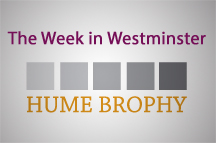Crazy Horse debate
 In round two of #NickvNigel this week, it was widely agreed that Clegg took yet another battering from the UKIP mastermind, with The Sun roundly concluding that the Deputy PM was “trounced”. It appears that viewers agreed, with 68% stating that Farage was victorious in a YouGov poll and 69% giving UKIP their support in an ICM poll. Perhaps the result was always to be expected, Clegg is in an entirely different position to the election debates in 2010, which were characterised by choruses of “I agree with Nick”.
In round two of #NickvNigel this week, it was widely agreed that Clegg took yet another battering from the UKIP mastermind, with The Sun roundly concluding that the Deputy PM was “trounced”. It appears that viewers agreed, with 68% stating that Farage was victorious in a YouGov poll and 69% giving UKIP their support in an ICM poll. Perhaps the result was always to be expected, Clegg is in an entirely different position to the election debates in 2010, which were characterised by choruses of “I agree with Nick”.
With trust within his own party and the wider electorate as a whole diminished, Clegg found himself defending a coalition government record, while Farage appeared increasingly credible in contrast. While the debates were spattered with amusing quips and sound bites (most notably “Billy No-Influence”), ultimately given the electoral standing of the two parties in question, little can be drawn from this exchange. Farage is considered to be a charismatic figurehead for UKIP but is perhaps unrepresentative of members in the wider party. This won’t prevent UKIP from benefitting significantly in the upcoming European elections however, the low turnout expected will bolster UKIP’s share, with party supporters being the only section of the electorate who have a core issue marshalling them. Equally, Clegg has done well to capitalise on this media opportunity to define Liberal Democrat principles, which to date have been considerably overshadowed by those of their coalition partners.
Scottish Referendum
The spectre of the Scottish referendum continues to rear its head in Westminster, and this week it was announced that voter registration in Scotland is the highest it has ever been: new estimates from the Electoral Commission indicated that 4.1million Scots were on the electoral roll. With less than six months to go until the vote on 18th September, this is a staggering display of public political interest.
Mobilised by the concept of national identity and sovereignty, the ‘Yes’ camp have successfully tapped into a level of electoral engagement that is not often seen during referendums and that Westminster politicians are sadly lacking. Much like the Quebec referendum however, while there is still a significant gap in the polls at the moment, this is only going to narrow as September looms. Devo-max is coming with all the political consequences that it entails. The debate bubbled on throughout the week, with the subsequent news that Tory MPs were lobbying Cameron to exclude Scottish constituencies from the next general election if Scotland votes for independence. While this is a logical approach to an extent, in the sense that the Scots won’t have a long-term stake in the outcome, it will be interesting to see if the practicalities of this proposal are workable.
Royal Mail clash
 Every week there is a Wednesday; and with it, the expectedly rowdy exchange at the dispatch box for politicos to pore over. This week did not fail to meet expectations, and we witnessed Miliband challenging Cameron to defend the sale of Royal Mail, soon after a report from the National Audit Office said the government had largely undervalued the institution. An irritated Cameron slung slurs at the Labour frontbenchers, calling the two Eds "the two muppets", while Miliband retorted that the PM was more "Dunce of Downing Street" than “Wolf of Wall Street”.
Every week there is a Wednesday; and with it, the expectedly rowdy exchange at the dispatch box for politicos to pore over. This week did not fail to meet expectations, and we witnessed Miliband challenging Cameron to defend the sale of Royal Mail, soon after a report from the National Audit Office said the government had largely undervalued the institution. An irritated Cameron slung slurs at the Labour frontbenchers, calling the two Eds "the two muppets", while Miliband retorted that the PM was more "Dunce of Downing Street" than “Wolf of Wall Street”.
Waitrose v Aldi
 On a lighter note, another political revelation this week was the news that Waitrose is David Cameron’s supermarket of choice. The retailer is conceivably more attractive than some of its cheaper competitors because its customers are more likely to engage in conversation with the Prime Minister. While Waitrose makes a great vanilla cheesecake, this may just be a further illustration of Cameron aligning himself with some his core voters.
On a lighter note, another political revelation this week was the news that Waitrose is David Cameron’s supermarket of choice. The retailer is conceivably more attractive than some of its cheaper competitors because its customers are more likely to engage in conversation with the Prime Minister. While Waitrose makes a great vanilla cheesecake, this may just be a further illustration of Cameron aligning himself with some his core voters.

Battling Boris
Tory stalwart Lord “Hezza” Heseltine waded into the Boris debate this week, declaring that he shouldn't stand for Parliament until his term as London Mayor is over. The young pretender received Cameron’s backing to return to the House recently, but Heseltine isn't convinced of his potential as a future PM - "He will certainly be a candidate, and a perfectly credible candidate, but there are other candidates and one or two obvious people have got very considerable qualifications as well."
Robert Condon
Managing Director UK, Hume Brophy












